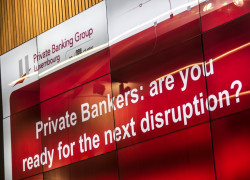PBGL Conference 2016
Private Bankers: are you ready for the next disruption?
On 3 February 2016, the ABBL’s wealth management cluster, the Private Banking Group, Luxembourg (PBGL), held a conference reflecting on a number of key aspects on the digital future of private banks in Luxembourg.
The conference aptly titled “Private Bankers: are you ready for the next disruption?” took place in the presence of Mr Pierre Gramegna, Luxembourg Minister of Finance, who gave an opening speech highlighting the focus of Luxembourg on the digitalization of financial services in order to bring the existing pillars of the financial center, such as its fund industry, wealth management sector or its capital markets infrastructure, to the next level.
Around 150 people, representing the whole Luxembourg financial ecosystem, attended the event hosted by KPMG. It was a splendid occasion for banking industry actors to discuss the key questions about the disruption brought to private banks by the digitalisation (r)evolution.
The first panel addressed the issue of whether KYC utilities could represent a real benefit for private banks. Moderated by Alain Hondequin (ABBL), the panel members, David Hagen (CSSF), Jed Grant (KYC3), Jean-Louis Schiltz (Schiltz&Schiltz) and Patrick Wagenaar (Degroof), looked at improving, respectively enhancing, client due diligence, on-boarding and relationship processes and how digital tools can help. Currently, banks are putting a lot of efforts, both human and financial, into trying to achieve higher efficiency in key processes and improved interaction with clients, among others by reducing complexity all along the value chain. The panel underlined that since client onboarding, profiling and monitoring processes have become more arduous and slower due to increasingly stringent regulations, there was a clear need for technology neutral laws and regulations, in particular allowing for online and video client interaction. The panel also concluded that assuming smooth into the existing systems, KYC utilities vendors could provide the needed support to private banks in enhancing the efficiency of their due diligence processes and big data analytics.
The second panel, addressing the recent phenomenon of so-called robo-advising, discussed whether algorithm-based advice was ready to take private banking clients away. Led by Pascal Denis (KPMG), the panelists Sandrine De Vuyst (ING), Jean-Michel Starck (HSCB) and Geoffroy de Schevel (Gambit) discussed about the recent notable surge of automated wealth investment services aiming to provide a low-cost alternative to wealth investment, and currently enjoying an exponential growth in market share. Two important take aways from the panel: on the one hand, the integration of technological advances has made this evolution in service provision inevitable and on the other hand, aspects of traditional wealth management services will remain relevant, in particular for higher client segment and for those clients appreciating the human engagement.
In his keynote speech on “How will blockchain affect the Private Banking industry?” Mr Dave Birch (Hyperion Systems Limited) for the benefit of private bankers clarified the concept of blockchain as a distributed ledger where every transaction made is verified and shared by a global network of computers: any party could use it to exchange information, including stock deals, legal contracts and property records, within minutes and with no need for a central authority to verify it.
In addition, he hinted that blockchain technology could in certain instances reduce the role of intermediaries, such as banks and settlement houses. Today, banks should reckon that this technology could save them money by making their operations faster, more efficient and more transparent.
For most private bankers digitalization is on top of the agenda. Apart from overcoming the obvious regulatory and compliance requirements of a complex cross-border business, digitalization of private banking with all of its components is clearly one of the most challenging issues to strategically integrate and implement. This is likely to impact both a much-needed operational cost efficiency all along the value chain, due diligence and advisory processes alike, as much as some of the fundamentals of client interaction, merging digital and face-to-face, thereby generally departing from a product-based model towards a client-centric one.
According to Mr Pierre Etienne, Head of the PBGL: “Digitalization should bring more added value to clients, either in their relationship with their bank / banker, or in the quality of service they will get from their bank / banker”.
-
 PBGL Conference Invitation
69.76 Ko
PBGL Conference Invitation
69.76 Ko
Communiqués liés
Les banques de détail luxembourgeoises prêtes à accueilli...
Face aux préoccupations que suscitent la décision de ING d’arrêter ses serv...
Generative AI: an opportunity rather than a threat
With questions mounting about the challenges and opportunities of generative art...
Il n'y a aucun résultat pour votre recherche



